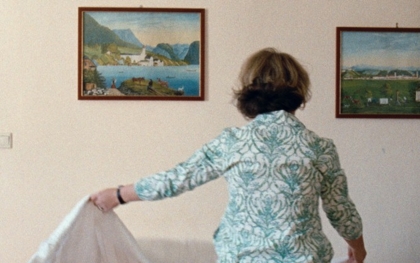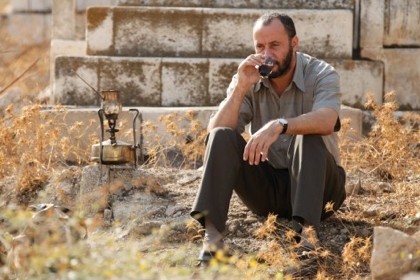Festivals
Berlinale 2012: The S&S blog
Two small gems from Jordan and Austria

What Is Love
Geoff Andrew, 12 February
Had Nick James’ opening Berlinale blog post not imposed a ban on mentioning all things thermometrical, it would have been nice to report that the competition programme in this year’s festival was hotting up.
Not that this attendee, halfway through the first Sunday, has encountered anything in that main strand that’s especially brilliant: not even Captive, an account of a real-life 2001 hostage crisis set in the jungles of the Philippines, directed by Brillante Mendoza. While a solid-enough recreation of events (marred only by a few problems of pacing), the film never generates quite enough tension to succeed as a genre piece; nor does it allow enough space for Isabelle Huppert, playing a French missionary among the group held by Muslim kidnappers, to take it into more interesting non-generic areas. It’s eminently watchable, but not a lot more.
That’s what I’ve felt about most of the competition entries I’ve seen so far. Christian Petzold’s Barbara, about country doctors working in the GDR in the early 1980s, was rightly admired by many. It’s very well put together, and Nina Hoss’s central performance, as the medic hoping to escape to the West but already under close surveillance by the authorities, is very fine; but I personally found it a little too studied, a little too cool. (Sorry, Nick.)
The Taviani Brothers’ Caesar Must Die – in which a cast of prison inmates are shown rehearsing a loose stage adaptation of Shakespeare’s Julius Caesar – suffers if anything from the opposite: a few of the inmates are inclined, here and there, to over-emote. But it remains a powerful piece, for all its brevity and modesty; indeed, as a witty cautionary tale of failed political idealism, revolutionary communal action, cyclical Utopianism and liberation (or not!) through art, it sits firmly within the tradition upheld by the veteran Italians.
I won’t go into detail about Meteora – a Greek film about the love between a monk and a nun set in the famously spectacular titular gorges – except to say that its animated icons, its use of Pérotin et al on the soundtrack and its dingy, soft-focus digital Scope compositions all struck me as somehow a little phoney.

The Last Friday
But the finest finds for this writer have been away from the main competition, in the Forum section. Even there it’s been possible to find films of few if any discernible virtues (the Iranian Modest Reception and the Austrian Spain being conspicuous examples), but they’re more than compensated for by two small gems. The first, Yahya Alabdallah’s The Last Friday, was also, I have to confess, the first film I’ve ever seen which was produced by the Royal Film Commission of Jordan (complete with a crown logo on the credits).
Not that it’s any way a propaganda piece for life in Amman; indeed, its protagonist is a cab driver deep in debt, separated from his wife and son and facing a tricky hospital operation, and many of the characters are less than sympathetic. But Alabdallah really knows how to tell a story through imagery, editing and sound (there’s not much dialogue), keeping us intrigued by its mysteries as well as involved in its emotional dynamics. It’s bold, assured stuff.
Those qualities might have been expected, too, of a new film by the Austrian writer-director of the ambitious and rigorous Struggle, which played at the Cannes, London film festivals and elsewhere – except that that was back in 2003. We’ve had to wait nine years for Ruth Mader’s second feature, and I’m glad to say that it was worth it. What Is Love (no question mark!) consists of five short vignettes about the role played by love in the seemingly unremarkable, even banal lives of various Austrian provincials, and mixes documentary with a little fiction (though it’s impossible to tell how much) to wholly engrossing effect.
Amazingly (and bravely on Mader’s part), sex doesn’t really come into play at all; moreover, as it deals with a priest, a single woman, a workaholic building society agent, a factory worker and a forest-owning family of Christians, it never feels remotely invasive or condescending. Even though the film is often very funny, it is also entirely respectful, even tender in its sympathies. I adored it.
« Starship stormtroopers: Iron Sky
Time for outrage: Tony Gatlif’s Indignados »
See also
Allonsanfàn remembered by Michael Brooke (July 2011)
White Material reviewed by Adrian Martin (July 2010)
Body of Lies reviewed by Roger Clarke (December 2008)
